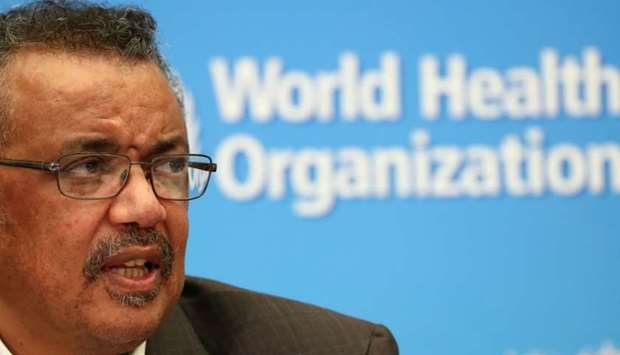• WHO warns against concluding Omicron is milder variant’
• EU approves fifth jab as WHO urges greater effort to end pandemic
The World Health Organisation (WHO) chief has called for the world to pull together and make the difficult decisions needed to end the coronavirus (Covid-19) pandemic within the next year.
“2022 must be the year we end the pandemic,” WHO Director-General Tedros Adhanom Ghebreyesus told reporters in Geneva.
As the end-of-year festivities approach, the UN health agency chief acknowledged that “all of us want to spend time with friends and family. All of us want to get back to normal”.
However, he said, to get back to normal, we need to protect ourselves now as cases, fuelled by the fast-spreading Omicron variant, surge.
Since it was first reported in South Africa in November, the Omicron variant has been identified in dozens of countries, dashing hopes that the worst of the pandemic is over.
Despite indications it is not more severe than the Delta variant – still the dominant strain – Omicron has been shown in early data to have higher transmissibility and a worrying resistance to vaccines.
With cases rising rapidly, Tedros stressed it was better to cancel events “now and celebrate later than to celebrate now and grieve later”.
“We have to focus now on ending this pandemic,” he stressed.
Tedros insisted that it is possible to halt the pandemic but said it would require using all the tools are our disposal, ranging from vaccines to mask-wearing and physical distancing.
And perhaps most importantly, the world needed to end the glaring inequity in access to vaccines.
“If we are to end the pandemic in the coming year, we must end inequity,” he said.
The WHO’s chief scientist meanwhile said that it is too early to conclude the Omicron variant was milder than other coronavirus strains, adding that it could still make enough people sick to “overburden” healthcare systems.
“...It is probably unwise to sit back and think this is a mild variant, (that) it’s not going to cause severe disease, because I think with the numbers going up all health systems are going to be under strain,” Soumya Swaminathan told Geneva-based journalists.
She added that this perception appeared to be based on initial data out of parts of South Africa which might give a misleading impression due to high levels of existing immunity among the population.
Yesterday the European Union approved its fifth Covid-19 vaccine, stepping up its battle against the Omicron coronavirus variant.
Europe is already far ahead of other parts of the world with its rollout of vaccines and booster shots, but the Omicron variant has helped fuel record case surges, forcing a return to harsh restrictions in some countries.
Paris has already cancelled its new year celebrations and Germany is expected to roll out tight restrictions on private parties and close nightclubs, according to a proposal seen by AFP.
“New Year’s Eve celebrations with a large number of people are unjustifiable in the current situation,” reads the draft document.
German government advisers were already urging much tighter restrictions across the board, with experts in several countries warning repeatedly that vaccinations alone will not be enough to stop Omicron.
However, British Prime Minister Boris Johnson ruled out any further tightening of the coronavirus rules over Christmas, while pledging to keep the situation “under constant review”.
The Netherlands has already imposed a Christmas lockdown and EU chief Ursula von der Leyen has warned that the Omicron variant could be dominant in Europe by mid-January.
The EU’s authorisation of the jab from US firm Novavax, which uses a more conventional technology than other Covid-19 vaccines, has raised hopes that people worried about getting vaccinated might now come forward.
It is the fifth vaccine approved in the bloc after shots from Pfizer, Moderna, AstraZeneca and Johnson & Johnson, and the EU has already signed a deal to buy up to 200mn doses of the two-shot Novavax vaccine.
“At a time where the Omicron variant is rapidly spreading ... I am particularly pleased with today’s authorisation of the Novavax vaccine,” EU chief von der Leyen said in a statement.
As the pandemic gathers pace, weary populations are faced once again with new rounds of restrictions and cancellations of big events.
The World Economic Forum (WEF) said it was postponing its annual January get-together of the world’s rich and powerful in the Swiss ski resort of Davos because of the new variant.
“Despite the meeting’s stringent health protocols, the transmissibility of Omicron and its impact on travel and mobility have made deferral necessary,” the WEF said yesterday.

(File photo) WHO Director-General Tedros Adhanom Ghebreyesus
